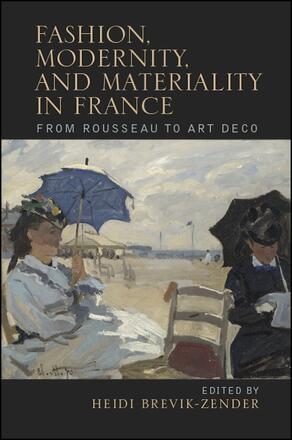
Fashion, Modernity, and Materiality in France
From Rousseau to Art Deco
An interdisciplinary examination of French fashion, modernity, and materiality from the eighteenth to the early twentieth centuries.
Description
This anthology explores connections between dress and modernity through interdisciplinary French humanities scholarship. It brings to life the reciprocal relationships between fashion and a range of primary source materials, including literary fiction, paintings, social commentaries, decorative arts, fashion magazines, mass-circulating newspapers, popular theatrical works, trade publications, and advertisements, among others. The book centers on a specific constellation of concerns—fashion, modernity, and materiality from the eighteenth to the early twentieth centuries—giving depth of focus. Themes include fashion's relationship to the arts, material production, conflict, memory, the nation, social class, race, and gender and sexuality. Among the broader questions framing the volume are some that remain highly pertinent today: What are the various and complex relationships that exist between clothing and the lived body? How do garments hold traces of the past and activate memories of the human experience? In which ways do clothing and adornment express sexualities? How does fashion help to define what it meant and means to be modern? Together, the essays demonstrate fashion's broad reach and appeal as an interdisciplinary category of analysis.
Heidi Brevik-Zender is Associate Professor of French and Comparative Literature at the University of California, Riverside and the author of Fashioning Spaces: Mode and Modernity in Late-Nineteenth-Century Paris.
Reviews
"…a welcome addition to the growing list of works on materiality and modern French literature, art and cultural history. Students and scholars alike will learn much. " — H-France Review
"This volume is a treasure. Lavish color illustrations accompany beautifully crafted essays by some of the most insightful—and articulate—scholars working in the overlapping fields of French literature, art history, gender studies, and material culture. It is a rarity to see these kinds of cross-disciplinary perspectives joined together under a single cover, and even rarer still for a set of essays to offer such a satisfying read. " — Rachel Mesch, author of Having It All in the Belle Epoque: How French Women's Magazines Invented the Modern Woman
"The dynamic intellectual and visual interplay between couture and culture becomes significantly enriched in this volume, where the dialogue between text and textile, appearance and apparel, interweave to produce conceptual advances on our understanding of modernism in France. " — Therese Dolan, author of Manet, Wagner, and the Musical Culture of Their Time
"The book's strengths lie in its interdisciplinarity, along with the deep knowledge and impressive scholarship of the contributors. Their specialist knowledge and their care in what they are writing shines through. " — Malcolm Barnard, author of Fashion Theory: An Introduction
"The essays in this collection establish a constellation of strong and rich French fashion notes in modern history, and together constitute a dynamic that resonates with recurring and related imagery and ideas. The fact that it's conceptually sophisticated and philosophical doesn't get in the way of it being a good read. " — Brian Seitz, author of Intersubjectivity and the Double: Troubled Matters